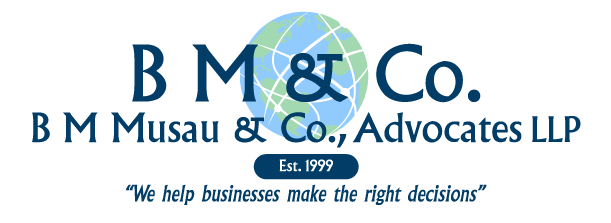At B M Musau & Co., Advocates LLP, we often encounter inquiries about asset imbalance resolutions, particularly debt-equity capitalisation, under Kenya’s corporate, commercial, and tax law. In this article, we address some frequently asked questions to provide clarity on this complex subject, drawing on both local statutes and international best practices.
What is Debt-Equity Capitalisation?
Debt-equity capitalisation is a financial restructuring method where a company converts its debt into equity. This process reduces the company’s debt burden and strengthens its equity base, enhancing financial stability and potentially improving its credit rating.
Why Consider Debt-Equity Capitalisation?
Debt-equity capitalisation is beneficial for several reasons:
- Improving Balance Sheets: Reducing debt levels leads to a healthier balance sheet, making the company more attractive to investors.
- Enhanced Creditworthiness: Lower debt increases the company’s creditworthiness, potentially lowering borrowing costs.
- Tax Efficiency: Interest payments on debt are tax-deductible, but excessive debt may lead to financial distress. Converting debt to equity may strike a balance between tax efficiency and financial stability.
What Are the Key Legal Considerations in Kenya?
In Kenya, debt-equity capitalisation involves several legal considerations under corporate, commercial, and tax law:
- Company Law Compliance
- Shareholder Approval: According to the Companies Act, 2015, significant changes in the company’s capital structure, such as issuing new shares to creditors, require shareholder approval.
- Valuation: Fair valuation of debt and equity is crucial to ensure the transaction is equitable for all stakeholders.
- Tax Implications
- Capital Gains Tax: Conversion of debt to equity may attract capital gains tax if it results in a change in the ownership of the company.
- Interest Deductibility: Post-conversion, the company loses the ability to deduct interest payments on the converted debt, affecting tax planning.
- Securities Law
- Disclosure Requirements: The Capital Markets Authority (CMA) mandates disclosure of material changes in the company’s financial position, including debt-equity conversions, to protect investors’ interests.
What Are the International Best Practices?
International best practices provide a framework for implementing debt-equity capitalisation effectively:
- Strategic Planning
- Comprehensive Analysis: Conduct a thorough analysis of the company’s financial position to determine the optimal balance between debt and equity.
- Stakeholder Engagement: Engage with stakeholders, including creditors, shareholders, and regulatory bodies, to ensure transparency and buy-in.
- Legal and Financial Advisory
- Expert Consultation: Engage legal and financial experts to navigate complex regulatory environments and optimise the structuring of the transaction.
- Due Diligence: Perform detailed due diligence to identify potential legal, tax, and financial implications and mitigate risks.
- Implementation and Monitoring
- Clear Agreements: Draft clear and comprehensive agreements outlining the terms of the conversion, roles, and responsibilities of all parties involved.
- Monitoring and Reporting: Establish mechanisms for ongoing monitoring and reporting to ensure compliance and address any arising issues promptly.
What Are the Potential Risks and Challenges?
Debt-equity capitalisation is not without risks and challenges:
- Dilution of Ownership: Existing shareholders may face dilution of their ownership stake, which may lead to resistance.
- Regulatory Scrutiny: The transaction may attract scrutiny from regulatory authorities, requiring robust documentation and compliance.
- Market Perception: The market might perceive the conversion as a sign of financial distress, potentially impacting the company’s stock price.
Conclusion
Debt-equity capitalisation is a strategic tool for resolving asset imbalances, but it requires careful consideration of legal, tax, and financial factors. At B M Musau & Co., Advocates LLP, we provide expert guidance to help companies navigate these complexities, ensuring compliance with Kenya’s laws and alignment with international best practices.
For tailored advice and assistance on debt-equity capitalisation or other corporate restructuring needs, please contact us at B M Musau & Co., Advocates LLP through email info@bmmusau.co.ke. We are here to support your business in achieving financial stability and growth.

I am a Kenyan Advocate and the Managing Partner of B M Musau & Co., Advocates, a position I have held since 1999. My work encompasses regulatory reforms, reduction of administrative burdens, the structure of business entities, joint ventures, acquisitions, banking, foreign investment and other general corporate areas

Write a comment: